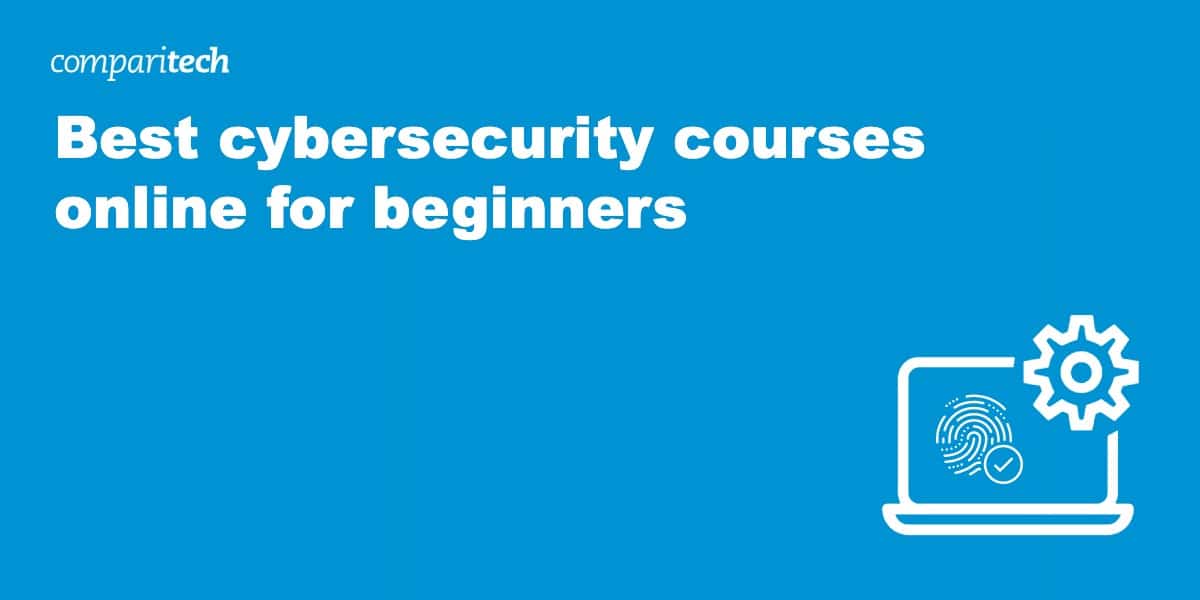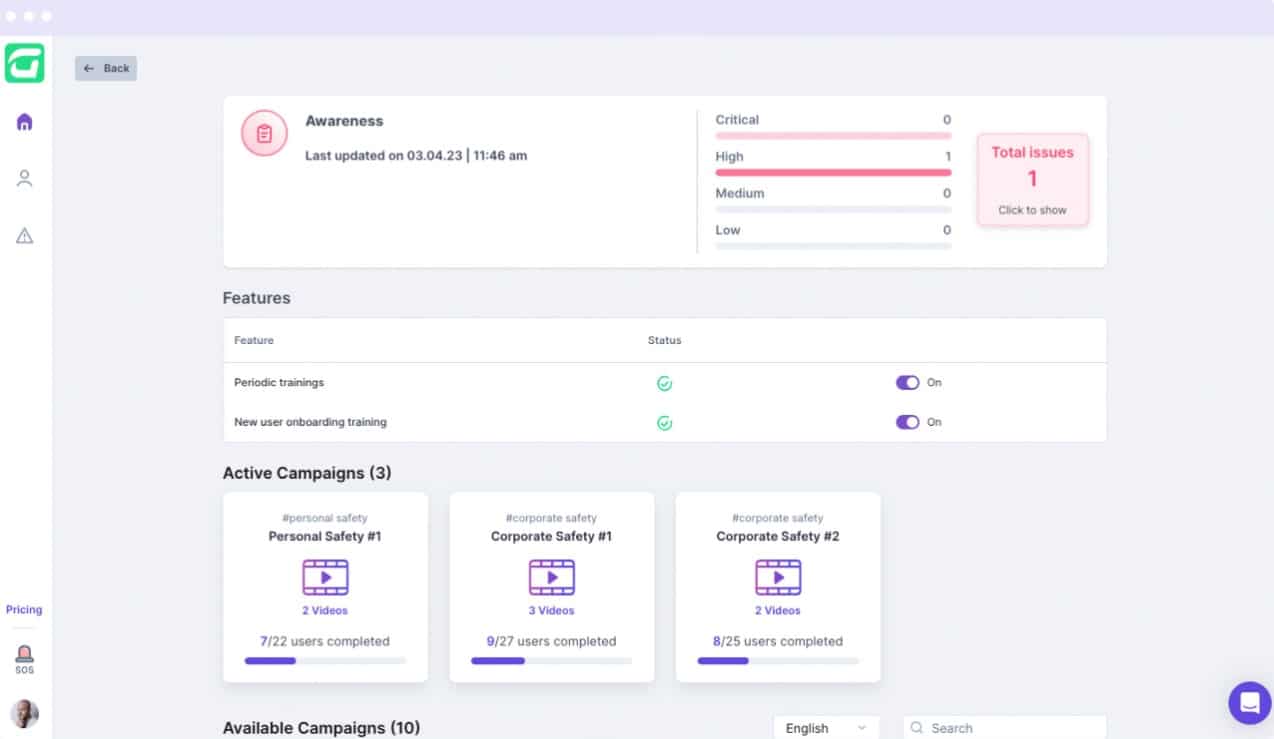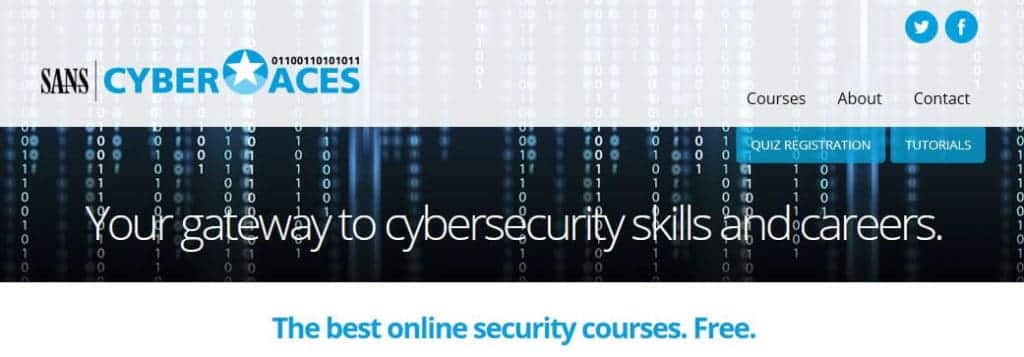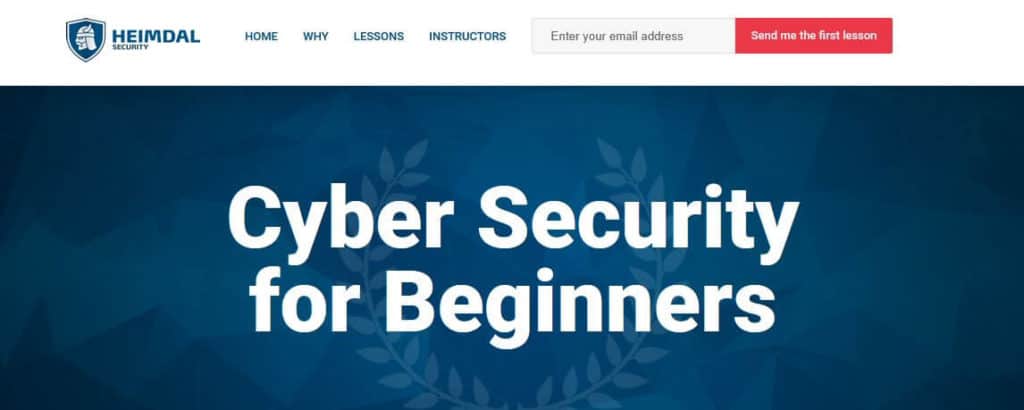Cybersecurity is one of the most pressing issues affecting businesses and consumers. Year after year, the number of cyberattacks, malware, ransomware, data theft, fraud, and identity theft continue to rise. One of the only positives of this is that more people than ever are interested in learning how to protect themselves and their businesses from cybercrime.
That’s where we come in. We’ve put together a list of the best online cybersecurity courses so that you can quickly see which are worth your time. Each has its own prerequisites, syllabus, price point, and target audience, but regardless of whether you’re looking to improve your cybersecurity knowledge for personal, professional, or academic purposes, there’s sure to be a suitable option below.
Here are the best cyber security courses online:
- StationX VIP Membership: Unlimited access to hundreds of cybersecurity courses including ethical hacking, penetration testing, and much more. Beginner-friendly and great value for money.
- Coursera Introduction to Cyber Security Specialization: Four entry-level courses to help you on your way to a career in cyber security.
- Guardz: A security platform that includes awareness training and phishing simulation.
- SANS Cyber Aces Online: Courses cover security fundamentals around networking, operating systems, and system admin.
- Heimdal Cyber Security for Beginners: A course geared towards the average user looking to increase their understanding of cybersecurity.
- Cybrary Introduction to IT and Cybersecurity: Covers network engineering, system administration, forensics, and penetration testing.
- Harvard Cybersecurity: Managing Risk in the Information Age: Cybersecurity course covering attack types, risks, and mitigation strategies alongside compliance and legal issues. Not cheap at £2,500.
We based our course selections on the following criteria:
- Value for money
- Doesn’t require much, if any, previous knowledge of cybersecurity
- Offers practical advice you can actually use
- Entirely online, with no travel required
- Provides certification upon completion
Best cyber security course online for beginners
Here’s our list of the best online cybersecurity courses for beginners:
1. StationX VIP Membership
StationX offers dozens of related to cybersecurity, including those teaching ethical hacking, penetration testing, networking, DevSec, digital forensics, cloud security, networking and incident response. It even has courses centered around passing top security certifications and preparing for examinations.
The StationX VIP Membership gives you unlimited access to all courses. Considering each normally costs $90–$2,000, the discounted VIP fee of $149 (usually $1,199) per year is well worth it. New courses are added all the time, and are presented by top security experts, so you know you’re getting the best of the best training.
For beginners, we suggest starting with The Complete Cyber Security Course.This is split into four distinct volumes, with classes taught by cybersecurity expert and StationX CEO, Nathan House. Here’s a brief overview of what you’ll learn in each:
- Hackers Exposed: Learn to stop hackers, block tracking, and prevent government surveillance.
- Network Security: Find out about network security, wifi security and hackers, firewalls, password managers, and more.
- Anonymous Browsing: Discover the world of anonymous browsing including hiding IP addresses, Tor, and VPNs.
- End Point Protection: Learn about antivirus software, malware, encryption, and application control.
All-in-all, this is a training toolbox that can serve you well as you embark on a career in the industry. Since it’s updated regularly, you can use it to stay on top of advances in cybersecurity and propel yourself further in your career. Because you can tailor your learning, this membership is particularly good for someone looking to take control of cybersecurity within their own company, or even someone who is simply interested in learning more about the field.
BEST CYBERSECURITY COURSES:StationX is our #1 choice for beginners. StationX VIP Membership provides unlimited access to all content including courses focused on passing top security certifications.
2. Coursera Introduction to Cyber Security Specialization
The way Coursera works is by grouping multiple courses into a “specialization.” You can take all courses within a specialization or choose specific ones. Each specialization includes a hands-on project which you’ll have to complete in order to earn a certificate.
The Introduction to Cyber Security specialization includes four courses:
- Introduction to Cyber Attacks: Provides a basic understanding of threats and vulnerabilities, and an overview of how cyberattacks are carried out.
- Cyber Attack Countermeasures: Teaches the basics of cyber defense and cryptography, including authentication solutions and public-key cryptography.
- Real-Time Cyber Threat Detection and Mitigation: Discusses real-time cybersecurity techniques and how to detect and prevent common attacks.
- Enterprise and Infrastructure Security: Introduces more advanced topics such as enterprise compliance frameworks and issues in blockchain and mobile security.
This set of courses goes beyond the basics, so is less suitable for home users looking to boost their cybersecurity knowledge. Instead, it’s targed more towards business owners or would-be cybersecurity professionals. The suggested time frame to complete this course is around four months, assuming you do four hours of study each week. The best thing about online learning is that you can go at a pace that suits you, though, so take as long as you need.
You can take many individual Coursera courses for free. However, to complete a specialization and its corresponding hands-on project to get a certificate, you’ll have to pay a monthly fee. Specializations come with a seven-day free trial after which they cost between $49 and $79 per month for each specialization. This means the quicker you get through the courses and projects, the less you have to pay. Alternatively, you can sign up for Coursera Plus, which costs $59 per month and allows access to more than 7,000 specializations with no additional fees.
Once you’re finished with this specialization, there are others you can undertake, such as Cybersecurity for Business and Applied Cryptography.
3. Guardz
Guardz presents two channels for end user security training: the first is a library of video-based courses and the second is a phishing simulator, which can be used to construct in-house training exercises. These two security training systems are supplementary to the main feature of this platform, which is to provide cybersecurity protection.
The Guardz platform protects endpoints and data held in the could. One of its main features is protection or the Google Workspace and Microsoft 465 systems. This focuses on the email packages and cloud drives in each suite. The system is packaged in plans that are priced per user per month and all plans include cybersecurity protection, the Employee Awareness Training system, and the Phishing Simulator.
The Employee Awareness Training system is hosted on the Guardz cloud platform. Users and administrators access the console for the service through any standard Web browser. The awareness training is implemented as a library of courses – each of which includes multiple videos. The administrator assigns a course to an individual or group of users and then gets feedback through the system as the user progresses through the course. The videos don’t all have to be viewed in one session, giving each user the flexibility to device on the pace of learning.
The administrator is able to see in the Guardz console how many of the users who have been allocated a course have actually completed it. It is then possible to run tests by generating phishing emails to challenge each user. Once everyone has absorbed the guidance of the courses, the administrator can turn on the cybersecurity protection system, which filters out malicious emails.
The lowest plan is called Starter and it includes the Employee Awareness Training package. This is priced at £5 per user per month. You can assess the Guardz system with a 14-day free trial.
4. Cyber Aces Online
SANS Cyber Aces Online courses are offered for free by the SANS Institute, which you’ve no doubt heard of if you’re in any way interested in cybersecurity. This organization is highly regarded in the field of information security and has been conducting research and education programs for three decades.
The institute runs in-person training events across the globe, but these typically cost thousands of dollars a pop. As such, to get some free online training from these guys is a treat. That being said, the current offerings are limited with just one course being available but if you’re just looking to get started in the world of cybersecurity, it’s perfect.
The course teaches the fundamentals of cybersecurity, covering the following:
- Operating Systems: Focusing on command line usage, this module teaches concepts and commands in Linux and advanced use of Windows.
- Networking: This covers the fundamentals of computer attacks and corresponding defense from a network point of view. You’ll find out about the protocols used in each OSI layer, in particular, the networking layer.
- System Administration: The final module teaches administrative functions in popular scripting environments.
You can opt to take courses with or without quizzes, which are presented in a multiple-choice format and test knowledge and understanding of each module.
This course is geared toward a prospective cybersecurity professional or members of the general public. The SANS Institute hopes that by offering courses like this for free, people will be better educated on cybersecurity, and it will ultimately “help strengthen the security of our nation.”
5. Heimdal Cyber Security for Beginners
Heimdal Security is a reputable firm providing technologies and intelligence in the fight against cybercrime. This organization is offering its handy Cyber Security for Beginners course free of charge. While many of the courses on this list are aimed at prospective cybersecurity professionals, this one is targeted more toward a general user looking to bump up their home cybersecurity.
This course is paced for you as lessons are delivered to your inbox every two days for around five weeks. Over the course of 20 lessons, you’ll learn:
- Cybersecurity basics such as vocabulary and setting up a security system
- Tools and tactics that can shield you from malware
- How to make your system less vulnerable to cyber threats
- Ways to keep your kids and other loved ones safe online
- How to explore the web safely (including email and social media)
- Security skills such as knowledge of how attacks work and how to avoid and deal with them
A few example lesson titles are “No more technical gibberish! Master basic security terms in 20 minutes,” “Share. Tweet. Protect. Repeat. – social media, the safe way,” and “What your kids & parents need to learn about cyber security.” You can see that this really is geared toward the home user and will be less relevant for someone looking to pursue a career in cybersecurity.
6. Cybrary Introduction to IT and Cybersecurity
If you’re debating a career in cybersecurity and thinking about which route to take, this course could be a good fit for you. Designed to help you make a decision between the main areas of cybersecurity, it covers four of the primary disciplines in a modular format than spans just over four hours worth of videos.
You’ll learn about system administration, privacy analysis, network engineering, incident response and forensics, and penetration testing.
Many Cybrary courses are free and if you like this course, there are plenty more to choose from. You can search their library based on course type and difficulty level. All courses are presented in video format, so are great for visual learners.
Note that once you’re in, there’s a fairly aggressive upsell to the Insider Pro version of Cybrary, which gives you access to additional courses and other perks such as career pathway guidance and a mentor. This costs $59 per month, which is pricey, but if you’re interested in any of the additional features (like certification prep), you might find this worthwhile.
7. Harvard Cybersecurity: Managing Risk in the Information Age
This Harvard course is split up into eight modules to be tackled over as many weeks. It should require an estimated 8–11 hours per week. By the end of this course, you’ll be able to develop a cyber risk mitigation strategy for your business or that of a client. You’ll also have knowledge of the legal and compliance processes that accompany cyberattacks.
You’ll learn about the various types of cyberattacks threatening businesses and which systems are at the highest risk of attack, as well as the importance of a holistic approach to cybersecurity. Modules include Identifying the threats of an organization (module 2), Understanding your technology (module 5), and Cyber risk and the law (module 6), among others.
Upon completion of this course, you’ll walk away with a certification for Advances in Learning from Harvard University’s Office of the Vice President. As expected, a course of this caliber does come with a hefty price tag. Currently, you’ll need to pay $3,190 to register. If you’re not on a tight budget, this piece of paper might be worth it, but for many, it’s simply inaccessible.
Why take a cybersecurity course?
Cybercrime is a growing problem. Almost everyone uses the web in some way, and even the relatively few who shy away from technology still have to deal with companies for which cybercrime is a real potential threat. As such, it has become a basic requirement for people to make themselves aware of the risks that are out there. Here are the three great reasons to take a cybersecurity course:
- To protect yourself and your family: It’s easy to plead ignorance and say that we should leave things to the experts, but think of it this way: the police catch thieves, but that doesn’t mean we make a habit of leaving our front doors unlocked or leaving our keys in the car. The fight against cybercrime needs to be a group effort, and educating yourself on threats and how to mitigate them is a great place to start.
- To protect your business: Businesses, large and small, are at risk of falling behind when it comes to cybersecurity. All too often business-owners only decide to step up their game when it’s too late and they’ve already suffered losses. DDoS attacks, data breaches, phishing schemes, and more can trigger major monetary losses and a lot of stress. Taking a cybersecurity course can help you be proactive in beefing up your business’ cybersecurity before it’s too late.
- To pursue a cybersecurity career: If you’re passionate about cybersecurity and think you’d like to pursue a career in the field, you’re in luck. It’s predicted that by 2025, there will be 3.5 million cybersecurity job openings. This industry is expected to grow from $175 billion in 2015 to $1.75 trillion in 2025. E-learning courses are low cost, and with suitable qualifications can open up the potential to a high-paid career in cybersecurity.
Tips for pursuing a cybersecurity career
Do you think a cybersecurity career could be right for you? Below we’ve put together our top four tips to help any beginner launch a cybersecurity career.
Here are some tips to help you get started in cybersecurity:
- Explore different areas of cybersecurity: There are so many directions a career in cybersecurity can take so it’s a good idea to explore all options and not narrow things down too quickly. Many of the above courses are inexpensive or free so you could complete multiple programs as part of your exploration.
- Practice as much as you can: To truly prepare for a cybersecurity career, you need to put your skills into practice. Many courses will include hands-on projects, but there are also lots of events, competitions, and other programs you can use to perfect your skills. For example, capture the flag events, hackathons, and bug bounties can all provide fun ways to put your knowledge into practice. Internships also offer excellent opportunities for honing your skills and might be a solid option if you’re struggling to gain the experience you need to break into a fulltime role.
- Join networking groups: The cybersecurity field is bursting with networks and forums comprised of like-minded individuals. Participants share knowledge and can help each other further their careers.
- Find a mentor: Another benefit of networking groups is you may be able to find yourself a great mentor. A mentor can be incredibly helpful as you navigate your cybersecurity career as someone to share ideas with and help guide you through key career decisions.
Cybersecurity course FAQs
What are the different topics covered in cybersecurity courses?
Cybersecurity courses typically cover a wide range of topics, from computer security basics to more advanced topics such as ethical hacking and network security. Here are some of the most common topics covered in cybersecurity courses:
- Computer Security Basics: This covers the basics of keeping your computer secure, including installing software updates and using strong passwords.
- Malware and Viruses: This covers how to protect your computer from malware and viruses, including how to spot them and what to do if your computer is infected.
- Identity Theft and Fraud: This covers how to protect your personal information from being stolen or used fraudulently. It includes topics such as phishing scams and credit card fraud.
- Ethical Hacking: This covers how to find and exploit security vulnerabilities in computer systems. Ethical hackers often use it to help organizations improve their security.
- Network Security: This covers how to secure networks from attacks. It includes topics such as firewalls, intrusion detection, and encryption.
Is a cybersecurity career well paid?
Yes! In addition to being a highly important technical skill to know about, cybersecurity is an excellent field to move into if you want to be compensated well for your time. Not only are cybersecurity experts highly sought after – they also take home well above-average earnings.
In 2021, cybersecurity experts in the US earned an average of $113,270 annually. In New York City, those earnings were even higher, coming in at around $133,210 per year. Needless to say, this makes cybersecurity a fantastic industry to move into.
How long will it take to learn basic cybersecurity skills?
On average it will take between six months and two years to learn about cybersecurity. If only a basic understanding is needed, a six-month course may suffice.
That said, if you intend to make cyber security your new career, you may find it necessary to enroll in a course that teaches advanced cybersecurity – including the practical skills and knowledge needed to carry out penetration testing and to be able to effectively set up secure networks and security systems.
Some of the longest cybersecurity courses available may take up to five years to complete. However, these will leave you with the skills you need to enter the workplace and start earning the big bucks!
How can i get cybersecurity experience once I complete a course?
Gaining practical experience in cybersecurity after completing a course can be achieved through several avenues:
- Internships: Many companies offer internships in cybersecurity. These positions provide hands-on experience and often involve working under experienced professionals. Internships also often lead to job offers.
- Entry-Level Jobs: Look for entry-level positions in cybersecurity, such as a junior security analyst or network administrator. These jobs can provide valuable experience and help you understand the practical aspects of cybersecurity.
- Certifications: Additional certifications can help you gain practical skills and demonstrate your commitment to the field. Certifications like CompTIA Security+, Certified Ethical Hacker (CEH), or Certified Information Systems Security Professional (CISSP) often involve practical components that can help you gain experience.
- Capture The Flag (CTF) Competitions: These are cybersecurity competitions where participants try to find and exploit vulnerabilities to capture a flag (usually a specific piece of data). These competitions provide hands-on experience and are a great way to learn and practice cybersecurity skills.
- Volunteering: Non-profit organizations and small businesses often need cybersecurity help but can’t afford professional services. Volunteering your time can help you gain experience while also helping others.
- Home Lab: Set up your own home lab for testing and learning. This can give you a safe environment to practice the skills you’ve learned in your course.
- Online Platforms: Websites like Hack The Box or Cybrary offer practical exercises and challenges that can help you gain hands-on experience.
- Networking: Attend cybersecurity conferences, seminars, and meetups. Networking with professionals in the field can lead to opportunities and provide valuable insights.
Remember, gaining experience takes time and practice, but every step you take brings you closer to a career in cybersecurity.
See also:









Hello
tried to enroll but page was not moving
Which course are you trying to enroll in?